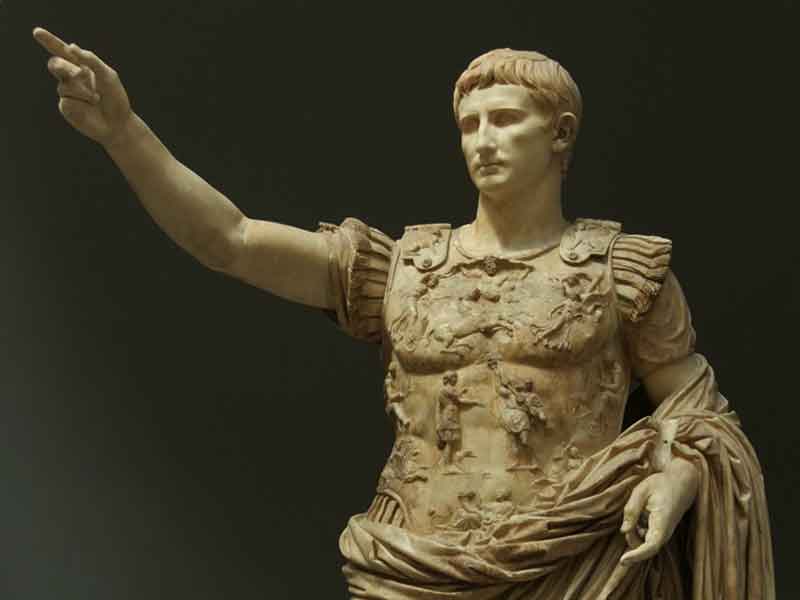Proud to introduce to you Emperor Augustus
Emperor Augustus
Also known as Octavian, was the founder of the Roman Empire and the first Roman emperor.
Here are some key aspects of his name, accomplishments, and achievements:
Birth
23 September 63 BC, Palatine Hill, Rome
Death
19 August 14 AD, Nola, Italy
Full name
Gaius Julius Caesar Octavianus
Augustus name
As a consequence of Roman customs and personal preference, Augustus was known by many names throughout his life.
On January 16, 27 BC, the Senate gave Octavian the title of "Augustus," which comes from the Latin word "augere," meaning "to increase."
It can be translated as "the illustrious one" and symbolized a second founding of Rome.
Accomplishments and Achievements
Rise to Power: Augustus rose to power after the assassination of his great-uncle Julius Caesar.
He formed the Second Triumvirate with Mark Antony and Marcus Aemilius Lepidus, eliminating political opponents and establishing control over Rome.
Military Successes: Augustus achieved significant military victories, including defeating Mark Antony at the Battle of Actium in 31 BCE.
Government and Administration: Augustus was an organizational genius and implemented administrative accomplishments that exceeded his military successes.
He reformed the government and administration of Rome, establishing a stable and efficient system.
Expansion of the Empire: Augustus expanded the Roman Empire through military campaigns and diplomacy.
He incorporated new territories, such as Egypt, into the empire, extending its reach and influence.
Pax Romana: Augustus initiated the Pax Romana, a period of relative peace and stability that lasted for approximately two centuries.
During this time, Rome imposed order on a world long convulsed by conflict.
Cultural and Architectural Projects: Augustus undertook numerous cultural and architectural projects, including the construction of public buildings, temples, and monuments.
He also patronized poets, writers, and artists, contributing to the flourishing of Roman arts and literature.
Rome arts and culture impact
Augustus' reign had a significant impact on the arts and culture of Rome.
Here are some ways in which Augustus' reign impacted the arts and culture of Rome:
Augustan Art and Architecture: Augustus' art and architecture reflected Rome's mythological origins and had a clear Classical and Hellenistic influence.
Augustus developed a "pictorial language" that enabled all inhabitants of the Imperium Romanum to participate in the revival of Classical culture and its ethical values while still preserving their national identity.
Augustus used art and architecture as a means of spreading pro-Principate propaganda and gaining public favor with his lavish, marble monuments.
Literature: Augustus' reign saw the flourishing of Roman literature, with its greatest writers being native Italians.
These writers used traditional themes as the basis for something new, reflecting the spirit of Augustus' Rome.
The culture of the age attained a high level of excellence, dominated by the personality of the emperor and his accomplishments.
Patronage: Augustus was a patron of the arts and supported poets, writers, and artists.
His patronage contributed to the flourishing of Roman arts and literature.
Religious Revival: Augustus' quest for religious revival led to the restoration of public monuments, especially the Temples of the Gods.
He also commissioned the construction of monuments that would further promote and encourage traditional Roman religion.
For example, the Ara Pacis Augustae contained symbols and scenes of religious rites and ceremonies, as well as Augustus and his "ideal" Roman family - all meant to inspire Roman pride.
Overall, Augustus' reign had a profound impact on the arts and culture of Rome. His patronage of the arts, religious revival, and support of literature contributed to the flourishing of Roman arts and literature. His art and architecture served as a means of spreading pro-Principate propaganda and gaining public favor, while his restoration of public monuments contributed to the revival of traditional Roman religion.
Major artistic achievements
During Augustus' reign, there were several major artistic achievements that had a significant impact on the arts and culture of Rome.
Here are some notable examples:
Augustan Architecture: Augustus commissioned the construction of numerous buildings and monuments that showcased Rome's mythological origins and incorporated Classical influences.
These structures included temples, arches, and public buildings that displayed grandeur and promoted the ideals of the empire.
Augustan Sculpture: Augustus' reign saw the development of a rich iconography in sculpture that depicted themes of legitimacy, stability, fertility, prosperity, and religious piety.
Sculptures of Augustus and his family were created to promote his power and legitimacy, and these visual motifs became standards for imperial art.
Ara Pacis Augustae: One of the most significant artistic achievements of Augustus' reign was the Ara Pacis Augustae, or Altar of Augustan Peace.
This monument celebrated the peace and prosperity brought by Augustus' rule and featured intricate relief sculptures depicting various scenes and figures.
Propaganda and Portraiture: Augustus used art as a means of spreading pro-Principate propaganda and solidifying his image as a leader.
His portraits were widely depicted in coins, sculptures, cameos, plaques, and other media, making him one of the most widely depicted individuals in ancient times.
Cultural Patronage: Augustus was a patron of the arts and literature, supporting poets, writers, and artists.
His patronage contributed to the flourishing of Roman arts and literature during his reign.
These artistic achievements during Augustus' reign served as powerful tools for promoting the legitimacy of his power, spreading propaganda, and shaping the cultural identity of Rome. They left a lasting impact on Roman art and culture, influencing subsequent artistic styles and themes throughout the Roman Empire.
Emperor Augustus summary
Augustus's accomplishments and achievements had a profound impact on Roman history.
His reign marked the transition from the Roman Republic to the Roman Empire, and his reforms and policies laid the foundation for the stability and prosperity of the empire for centuries to come.

Content created by:
Alex Costin
Results driven services:
Digital Marketing
Need my expertise?
Contact me
No tracking cookies!
General information purposes only!
Business partners offers (backlinks):
Search Engine Optimisation agency:
SEO
Explore this city secret guide:
Barcelona
Outdoor recreational activity:
Canyoning
Wide range of financial services:
Chartered Accountant
Copyright © 2023 Alex Costin